“We all know that even the best plans can hit unexpected roadblocks.”
Healthcare software is no different!
Many healthcare software projects struggle before they even launch. In fact, around 62% of hospital IT initiatives face integration challenges in their first year, clearly showing how critical planning, compliance, and technical expertise really are.
As a result, these challenges can lead to delays, increased costs, and frustrated teams. Therefore, partnering with a reliable healthcare software team can make all the difference, helping you deliver quality care without compromise.
In this blog, we will explore the essential criteria for working with a healthcare software development team, the vital questions to ask, and a practical checklist to guide your decisions.
So before we start, here are the highlights:
- We’ll explore what really matters when working with a healthcare software team.
- Then, you’ll discover actionable steps to achieve success with confidence.
- Along the way, you’ll get the tools to move forward with clarity and control.
What are the Criteria for Picking the Right Healthcare Software Development Partner?
It can be challenging to find the ideal healthcare development partner. Working with the right healthcare software development partner can make or break your project. It’s not just about coding skills. You need a team that understands the complexities of healthcare, compliance, and patient needs.
Let’s highlight what really matters when selecting a partner for your healthcare software project.
Table of Contents
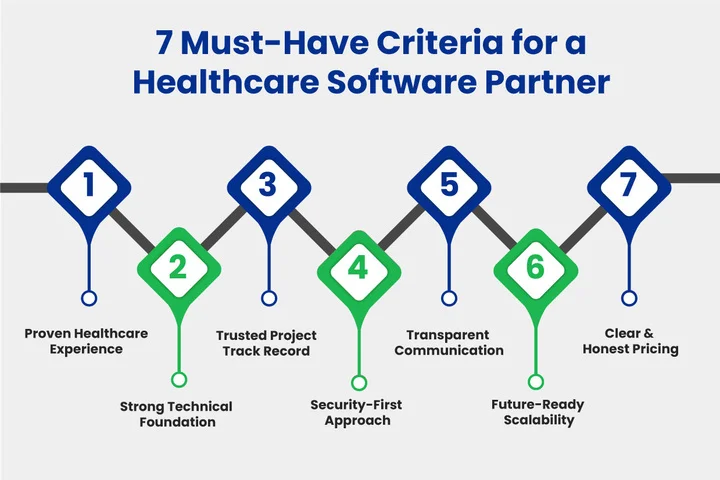
1. Industry Expertise and Compliance Knowledge
It is imperative to comprehend healthcare regulations. A healthcare IT development firm with substantial industry experience knows rules such as HIPAA and GDPR inside and out.
Additionally, they understand how hospitals, clinics, and telemedicine platforms operate, which helps avoid costly mistakes. Working with a team familiar with healthcare challenges ensures your software is both reliable and compliant.
2. Technical Capabilities and Technology Stack
A strong healthcare software vendor must have the right technical expertise for your project, whether developing in-house or through healthcare IT outsourcing partnerships that provide access to specialized teams.
Additionally, the team’s experience in custom healthcare software development ensures your solution works smoothly, reduces delays, and avoids costly errors. Choosing a partner with proven technical skills keeps your project on track from start to finish.
3. Portfolio and Case Studies in Healthcare
When selecting a software development company for the healthcare industry, it is crucial to look at their track record. A strong portfolio shows they have handled projects similar to yours.
Additionally, client feedback and case studies provide insight into their problem-solving abilities and reliability. A medical software development company with proven results gives you confidence that your project will be in capable hands.
4. Data Security and Regulatory Compliance (HIPAA, GDPR, etc.)
Protecting patient data is essential for any healthcare software development company. A team following healthcare software development criteria ensures strong encryption, secure authentication, and proper audit trails.
Compliance with HIPAA and GDPR guarantees your software meets legal standards and safeguards sensitive information. Choosing a partner who prioritizes security builds trust with patients and reduces the risk of breaches or penalties.
Struggling with project delays? The right experts can reduce setbacks by 30% and ensure a timely launch.
5. Project Management Approach and Communication Style
A smooth development process depends heavily on how a team manages projects and communicates with clients. Teams that follow structured project management methods ensure deadlines are met and tasks are clear.
Additionally, clear and consistent communication keeps you informed at every stage. A partner who provides regular updates, responds promptly, and listens to your feedback makes collaboration easier and helps avoid misunderstandings.
When selecting a team with the appropriate project management approach, ensure your project stays on course and delivers the outcomes you anticipate.
6. Scalability, Maintenance, and Post-Launch Support
When selecting a team, it’s essential to consider long-term care for your software:
- Ongoing maintenance: The team ensures your software runs smoothly after launch.
- Ability to scale: A partner experienced in custom healthcare software development can expand features, support more users, or adapt to new platforms as your service grows.
- Future-proof support: Continuous updates and technical assistance keep your solution effective, secure, and reliable over time.
7. Pricing Models and Transparency
To understand the standard pricing approaches and plan your budget:
| Pricing Model | Best For | Cost Range |
|---|---|---|
| Fixed-Price | Projects with clear, well-defined requirements | $20,000–$50,000 |
| Time & Material | Flexible scope; pay for hours worked | $40–$120 |
| Dedicated Team | Long-term, full-time project needs | $5,000–$15,000 |
Transparent pricing ensures there are no hidden fees and keeps the project running smoothly.
What Questions to Ask a Healthcare Software Developer?
Asking the right questions is essential to ensure the team can meet your project’s needs. It helps clarify their expertise, approach, and alignment with your goals.
Next, here are some essential questions to help you identify a partner who delivers reliable, practical solutions.
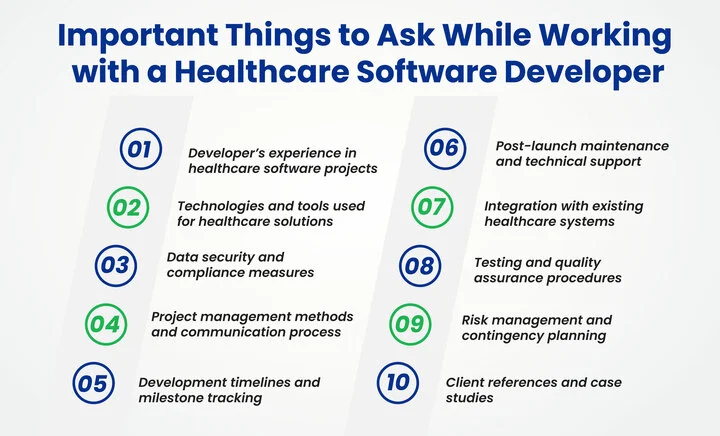
Question 1: What Experience Do You Have in Healthcare Software Development?
Start by asking about the team’s experience and expertise. It’s essential to understand their background in building healthcare solutions.
A team with relevant expertise knows the challenges of patient data management, regulatory compliance, and integrating with medical systems.
Additionally, asking about past projects and industries they’ve served gives insight into their ability to handle your specific requirements. Experience in similar projects often means fewer delays and smoother development.
Question 2: Which Technologies and Tools Do You Use for Healthcare Projects?
A team with experience in custom healthcare software should be familiar with EHR systems, telemedicine platforms, AI tools, and secure cloud solutions.
Understanding their tech stack is crucial because it influences how easily your software can scale in the future and how well it integrates with current systems. It also gives insight into how efficiently the team can develop, test, and maintain your solution.
Key factors to consider:
- Compatibility with your current systems and workflows.
- Ability to handle future updates or feature expansions.
- Efficiency in development, testing, and ongoing maintenance.
Question 3: What Should You Ask About the Development Process and Timelines?
Delays can be prevented by understanding how a team manages development. Clear timelines and structured processes keep the project on track.
Consider asking:
- How is the development workflow organized?
- Which project management methods are used?
- How are milestones tracked and delivered?
- How often will progress updates be provided?
These questions ensure you understand the workflow, deadlines, and accountability throughout the project.
Question 4: What Questions Can Clarify Compliance and Data Security?
Patient data protection is critical in healthcare. Asking about compliance shows how a healthcare software development company safeguards sensitive information.
Key points to check:
- How do you follow HIPAA, GDPR, and other regulations?
- What encryption and storage practices are used?
- Are security audits conducted regularly?
- How do you manage potential data breaches?
These questions help ensure the software is secure, reliable, and meets all legal requirements.
Question 5: How Can You Evaluate Support and Long-Term Collaboration?
Post-launch support affects your software’s reliability. A company that offers ongoing maintenance and collaboration ensures long-term success.
Consider asking:
- What post-launch support services are provided?
- Can you help scale the system or add new features?
- Are maintenance agreements available for long-term care?
- How quickly do you respond to issues or updates?
These questions help you find a partner committed to keeping your software functional, adaptable, and efficient over time.
Question 6: How Will the Software Integrate with Existing Systems?
Integration is critical for smooth operations. A good software partner designs solutions that grow with your organization. Scalability ensures your system can handle more users, additional data, or new features without disruption.
Consider asking:
- Can the software connect with existing hospital or clinic systems?
- Are APIs or other integration methods supported?
- How will future integrations or upgrades be handled?
Proper integration reduces workflow disruption and ensures data consistency.
Question 7: What Are Your Testing and Quality Assurance Practices?
Reliable software requires thorough testing. Asking about QA shows whether the healthcare software development company prioritizes quality and minimizes bugs.
The factors to consider:
- How do you conduct functional and performance testing?
- Are there automated and manual testing procedures?
- How are issues tracked and resolved before launch?
Strong QA practices ensure the software is stable, secure, and ready for real-world use.
Question 8:. How Do You Handle Risk Management and Contingency Planning?
Every project faces risks. Knowing how a healthcare software development company manages them helps prevent delays or failures.
Consider asking:
- How are potential project risks identified?
- What contingency plans are in place for delays or technical issues?
- How are critical incidents handled during development?
A proactive approach keeps the project on track and avoids unexpected problems.
Question 9: Can You Provide References or Case Studies from Past Clients?
References give insight into the company’s reliability and performance. A medical software development company with positive client feedback demonstrates proven capability.
Ask about:
- Case studies or examples of similar healthcare projects.
- Contactable references for feedback on experience and results.
- Success stories that highlight problem-solving and delivery.
Question 10: How Do You Ensure Scalability and Future-Proofing of the Software?
A healthcare software development company should design solutions that grow with your organization. Scalability ensures the software can handle more users, data, or features as needed.
Key points to ask:
- Can the system support increased patient data or users over time?
- How easy is it to add new features or integrate emerging technologies?
- Are updates and improvements planned to keep the software current?
Ensuring scalability and future-proofing keeps your software effective and reliable as your healthcare service evolves.
Final Checklist for Evaluating a Healthcare Software Development Company
Use this checklist to ensure you cover all critical aspects when evaluating a healthcare software development company. Each item on the checklist below emphasizes important factors to confirm before making a choice.
| Checklist Item | What to Verify/Ask | Status |
|---|---|---|
| Industry Expertise & Compliance | Has the company worked on healthcare software before? | ☐ |
| Technical Skills & Technology Stack | Can they handle EHR integrations and AI tools? | ☐ |
| Portfolio & Client References | Do they have relevant case studies? | ☐ |
| Data Security | Is patient data properly encrypted and secured? | ☐ |
| Project Management & Communication | Do they follow structured project management methods? | ☐ |
| Scalability & Post-Launch Support | Can the software scale and support future updates? | ☐ |
| Pricing Transparency | Are pricing models transparent with no hidden costs? | ☐ |
| Integration & Interoperability | Can the software integrate with existing systems? | ☐ |
| Testing & Quality Assurance | Are automated and manual testing procedures in place? | ☐ |
| Risk Management | Are contingency plans ready for delays or technical issues? | ☐ |
This checklist simplifies your selection of healthcare IT software vendors, helping you evaluate experience, compliance, and pricing transparency.
Frequently Asked Questions (FAQs)
2. How Can You Evaluate A Healthcare Software Development Partner?
To evaluate a healthcare software development partner effectively, consider the following:
- Review their portfolio and case studies to assess experience in healthcare projects.
- Check how well they handle compliance, security, and data protection.
- Evaluate their project management approach and communication style.
- Understand their testing, quality assurance, and delivery processes.
- Confirm that they offer ongoing support and system maintenance after launch.
3. Why Is Compliance Important In Healthcare Software Development?
Compliance ensures your software meets legal and security standards, such as HIPAA and GDPR. Partnering with a medical software development company that follows these regulations helps protect patient data, reduce risk, and maintain your organization’s credibility.
4. What Are The Most Important Things To Check When Choosing A Software Development Company For Healthcare?
Check for healthcare-specific expertise, security and privacy measures, a reliable project management process, and positive client feedback. The best custom healthcare software development teams also provide ongoing maintenance, scalability, and transparent pricing to ensure long-term success.
5. How Much Does Healthcare Software Development Typically Cost?
The cost depends on project complexity, features, and engagement model. On average, a healthcare software development company may charge:
- $20,000–$50,000 for fixed-price projects,
- $40–$120/hour for time-based models, or
- $5,000–$15,000/month per developer for dedicated teams.
Transparent pricing helps you manage budgets effectively.
Final Thoughts: Ensuring Success with Your Healthcare Software Partner
Healthcare software works best when it combines strong expertise, secure systems, and the right technical tools. Clear communication and organized project management make sure development stays smooth, deadlines are met, and results meet expectations.
However, looking at portfolios, client stories, and transparent pricing adds confidence and avoids surprises along the way. Regular updates, thorough testing, and risk planning keep the software reliable, while seamless integrations make daily workflows easier.
In addition, consulting a cloud development expert strengthens your infrastructure, improves performance, and keeps systems secure. This approach allows software to grow with operations while maintaining efficiency and reliability.
Ultimately, these steps, along with the checklist, help organizations handle challenges confidently, achieve tangible results, and build lasting success.
Organizations can achieve these objectives efficiently while remaining compliant and innovative by deploying trusted healthcare software development services.
Struggling To Find A Reliable Healthcare Software Partner Who Ensures Compliance And Smooth Integration?





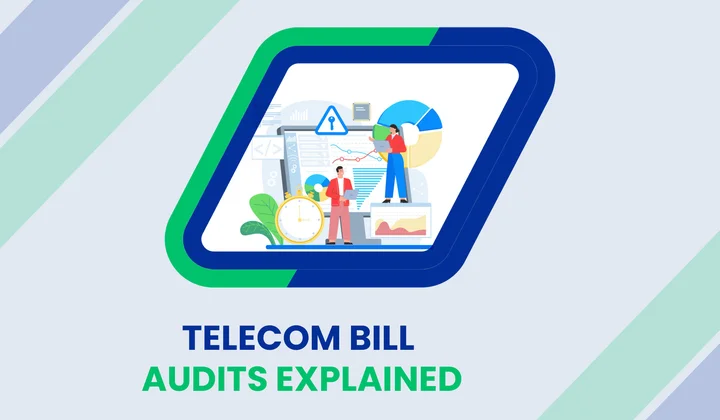
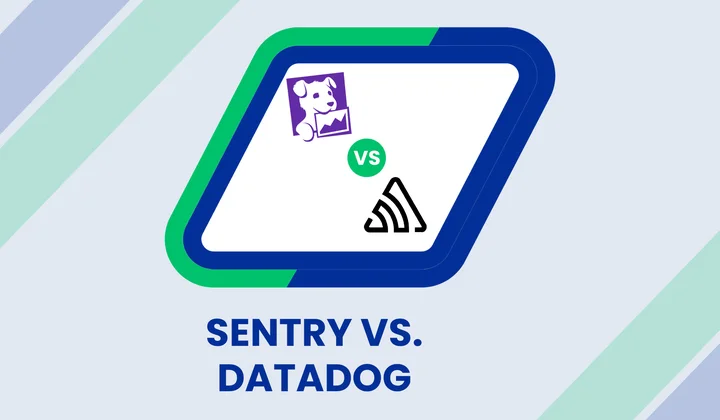
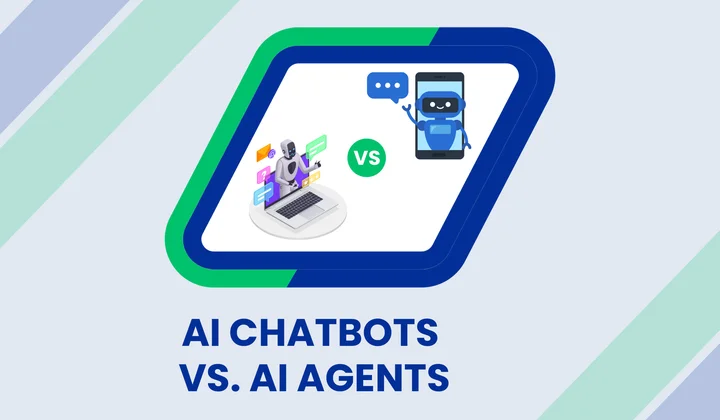
Share your thoughts about this blog!